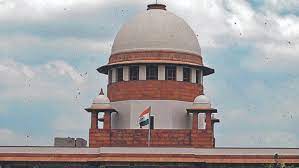The issue in dispute relates to their non-empanelment for promotion to the rank of Colonel by selection. (Para 2)
The nub of the dispute in the present case relates to the manner in which the CRs of the women officers were assessed for the purpose of Special No 3 SB after the decision in the above case. (Para 10)
The above tabulation shows that the same cut off has been adopted for batches of the women officers who were considered in Special No 3 SB as for corresponding batches of male officers. For example, for the 1995 batch, the cut off for both the women officers and the corresponding male officers is 31 May 2012. For the succeeding batches right up to 2005, the tabulated chart shows that the same cut off has been applied. The manner in which the cut off has been applied for reckoning CRs of the women officers for empanelment as Colonels is arbitrary because it is both contrary to the principles which were laid down by this Court in its judgment in Nitisha and contrary to the policy framework which has been enunciated by the Indian Army itself. (Para 18)
We are constrained to observe that the attitude has been to find some way to defeat the just entitlement of the women officers. Such an approach does disservice to the need to provide justice to the women officers who have fought a long and hard battle before this Court to receive their just entitlement under the law. Even after the judgment in Nitisha, the women officers have been compelled to move this Court repeatedly for the realization of their rights. (Para 21)
We accordingly order and direct that:
(i). A fresh exercise of reconvening Special No 3 SB shall be conducted no later than within a fortnight from the date of this order for all the women officers who were considered by the earlier Special No 3 SB (except for those officers who have already been empaneled);
(ii). In the course of Special No 3 SB to be convened in pursuance of the above direction, the Attorney General states that a common cut off of June 2021 shall be taken into reckoning in order to obviate any controversy;
(iii). Since during the pendency of these proceedings, one of the officers, Colonel (Time Scale) Asha Kale has retired, her case shall also be considered on a similar footing; and
(iv). Those officers who have already been empaneled or promoted as Colonels, shall not be disturbed or affected in any manner nor will their seniority be affected by the implementation of these directions.
SUPREME COURT OF INDIA
2023 STPL(Web) 421 SC
[2023 INSC 985]
Nitisha And Others Vs. Union Of India And Others
Miscellaneous Application No 1913 of 2022 In Writ Petition (Civil) No 1109 of 2020 with Miscellaneous Application No 246 of 2023 In Writ Petition (Civil) No 1109 of 2020-Decided on 03-11-2023
https://stpllaw.in/wp-content/uploads/2023/11/2023-STPLWeb-421-SC.pdf







